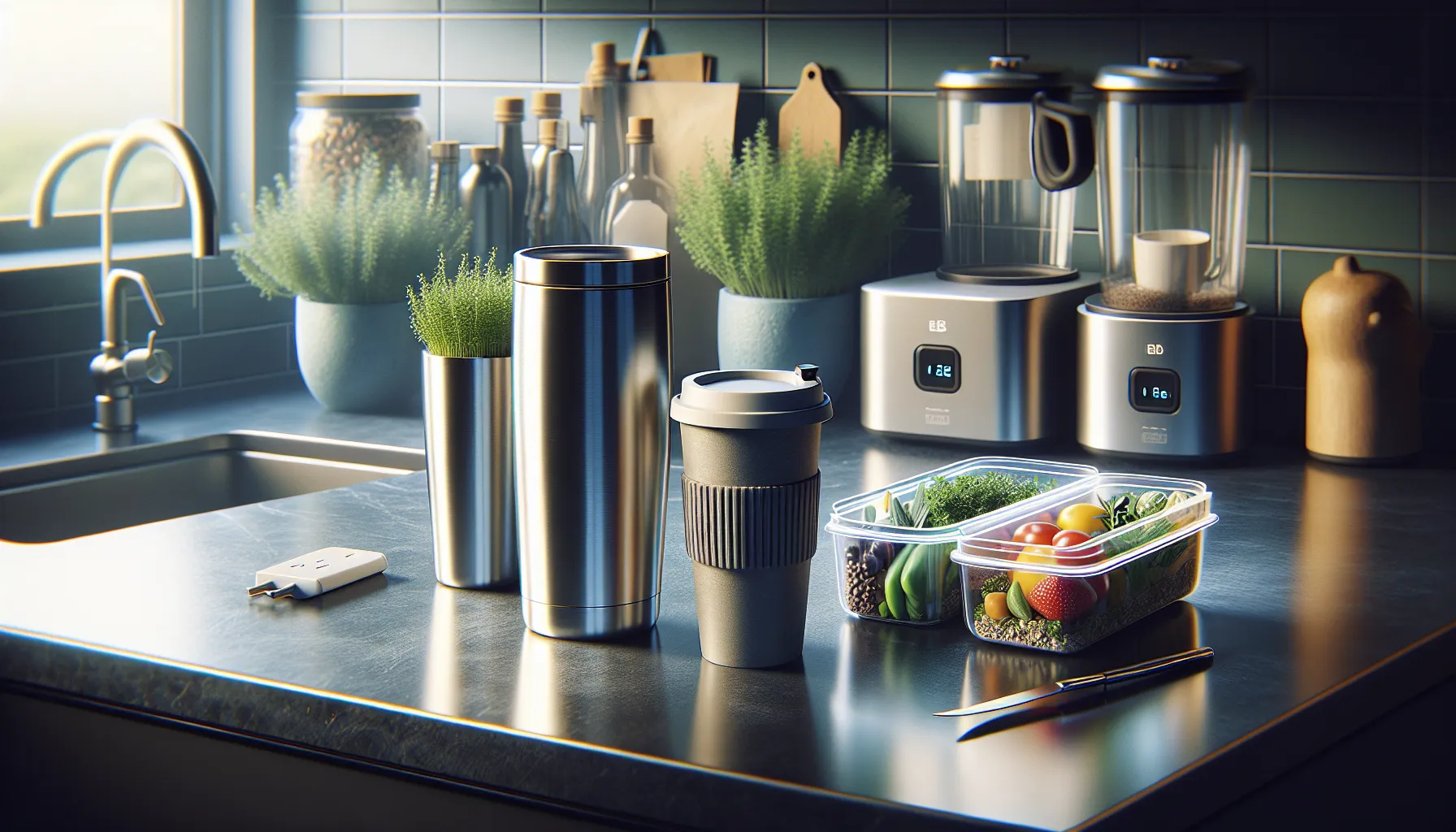Striking a balance between convenience and sustainability is a challenge many face in today’s fast-paced world. This article explores practical strategies to harmonize these seemingly conflicting needs, drawing on insights from leading experts in sustainability and lifestyle management. From eco-friendly lawn care to smart composting devices, discover how small changes can lead to significant positive impacts on both your daily life and the environment.
- Plan Ahead for Sustainable Gift-Giving
- Eco-Friendly Lawn Care Balances Quality and Environment
- Digital Tools Streamline Work and Reduce Waste
- Embrace Digital Products for Sustainable Business
- Mindful Packaging Choices Honor Heritage and Earth
- Reusable Storage Bins Organize Homes Sustainably
- Eco-Friendly Materials Elevate Product and Packaging
- Reusable Gear Enhances Adventure While Protecting Nature
- Small Shifts in Takeout Habits Reduce Waste
- Smart Composting Device Makes Sustainability Fun
- Donating Reusable Materials Balances Efficiency and Responsibility
- Reusable Bottles Foster Intentional Living in Recovery
- Reusable Coffee Tumblers Save Money and Environment
- Cargo E-Bikes Cut Emissions for Urban Contractors
- Mindful Consumption Aligns Purchases with Long-Term Value
Plan Ahead for Sustainable Gift-Giving
Celebrating birthdays and other special occasions is always fun. However, shopping for gifts and ensuring they arrive on time can add a lot of stress to any situation. My favorite go-to gift for women is the gift of self-care because every woman needs a little more time to themselves. Unfortunately, when it comes to self-care, the products you can conveniently pick up at the drugstore or the mall are often the opposite of sustainable: single-use sheet masks, plastic-wrapped bath bombs, or candles and lotions made with toxic ingredients. On the flip side, if you aren’t thinking ahead, shopping online for last-minute sustainable gifts often means carbon-heavy overnight delivery.
My solution: planning ahead and finding “go-to” ethical brands takes the stress out of my gift-giving efforts.
Instead of panic-buying a plastic-clad spa set from a big-box store, I set reminders on my calendar two weeks before those important birthdays or special occasions. When that reminder pops up, I go to my favorite online shop (hereiambox.com), which sells sustainable self-care products AND lets me schedule the delivery to arrive right before the special day. I can also include a customized gift card. This allows me to send highly relaxing gifts from the convenience of my home without relying on expedited shipping.
Pro tip: For your own sustainable care, start with one swap (like reusable facial cloths) and build from there. Small steps compound into transformative change.
 Renee Trepagnier
Renee Trepagnier
CEO, Here I Am
Eco-Friendly Lawn Care Balances Quality and Environment
It is something we face daily, especially as business owners and homeowners. We’ve found a way to deliver quality lawn care that’s not only efficient but also environmentally responsible. One example is how we manage the mowing process. Instead of using gas-powered mowers, which emit a lot of carbon, we’ve invested in battery-operated equipment. This switch has reduced our carbon footprint and lowered fuel costs, all while maintaining the same high standards of service. Plus, battery-operated tools are quieter, creating a more pleasant experience for our clients and their neighbors.
We’ve also shifted to using eco-friendly fertilizers that promote healthy soil without the harsh chemicals that can leach into waterways. As a result, our clients get lush, green lawns that are also safe for children and pets. It’s all about finding solutions that meet customer needs without compromising the environment. Customers have shared how they appreciate these sustainable practices, particularly those who are concerned about the health of their yards and the planet.
The real beauty of this approach is how it connects with people’s personal values. Homeowners today are more mindful of the environmental impact of their choices. When they choose us, they’re getting a solution that delivers on both aesthetics and sustainability. One of our regular clients recently told me how they feel proud to have a beautiful lawn knowing that it’s achieved with minimal environmental impact.
We’re committed to empowering homeowners with options that help them achieve their lawn goals. By blending convenience with sustainability, we help our customers maintain a beautiful lawn while also taking care of the planet. Through thoughtful choices like energy-efficient tools and environmentally safe fertilizers, we prove that it’s possible to have the best of both worlds.
 Francis Daniels
Francis Daniels
Founder & CEO | Turfpro, Turf Pro
Digital Tools Streamline Work and Reduce Waste
I shifted to digital notebooks and task planners to reduce paper usage, and honestly, it’s one of the most practical and lasting compromises I’ve made between convenience and sustainability. Back when I was first building out the foundation of the program I now run, I was constantly scribbling ideas on paper, notes about recovery frameworks, daily schedules, community meeting takeaways, and personal reflections. The ideas were valuable, but the system wasn’t. Sticky notes would get lost, notebooks would pile up, and I found myself rewriting the same things over and over just to stay on track. I was creating a trail of clutter, physically, mentally, and environmentally.
The shift didn’t happen overnight. It took some time to find a digital setup that felt just as natural as putting pen to paper, especially since writing had always been a big part of how I processed ideas. But once I found a rhythm, organizing my daily tasks by category, setting reminders, syncing across devices, it completely changed how I show up in my work and in my personal life. Whether I’m speaking to a high school about recovery, coaching someone one-on-one, or just managing my own day through a 12-step program, everything I need is right there in front of me, without the waste. I’ve gone from carrying around stacks of paper to having a streamlined digital hub that actually helps me stay more focused and accountable.
This wasn’t about going high-tech for the sake of it. It was about aligning my day-to-day habits with the same values I try to live by and instill in others: accountability, discipline, and awareness. It turns out that sustainability and convenience don’t have to cancel each other out. With the right structure in place, you can honor both. The clarity I gained through this shift has helped me stay grounded not just as a leader, but as someone still doing the daily work of recovery. For me, it’s just another example of how being intentional with small decisions can create lasting impact.
 Timothy Brooks
Timothy Brooks
CEO, Synergy Houses
Embrace Digital Products for Sustainable Business
As a founder, mom, and someone who values efficiency and intentional living, I’ve learned that sustainability doesn’t have to mean sacrificing convenience—it just means making smarter, more aligned choices. One compromise I’ve made is prioritizing digital over physical whenever possible—from the products I create to how I organize my home and business.
Instead of printing planners or shipping physical toolkits, I’ve built everything digitally—not just for ease and cost savings but also to reduce waste and support more conscious consumption. This allows me to serve more people without the packaging, production, or shipping footprint. It’s not about being perfectly sustainable—it’s about making thoughtful swaps that work with your lifestyle, not against it.
 Kristin Marquet
Kristin Marquet
Founder & Creative Director, Marquet Media
Mindful Packaging Choices Honor Heritage and Earth
I live at the intersection of “do it fast” and “do it right.” Balancing convenience with sustainability isn’t always easy, but I’ve found my groove in small, consistent choices. I use biodegradable packing peanuts, reusable pouches, and cardboard boxes for shipping my incense—materials that protect the product and the planet.
I grew up hearing “waste not, want not,” and I carry that into my business. Sustainability isn’t about aesthetics for me—it’s about care, integrity, and honoring what we’ve been given. It’s a quiet commitment, not a performance. And if my ancestors were watching me pack an order, I’d want them to nod in approval.
 Monique Diaz
Monique Diaz
Founder & CEO, Geechee Mama Candles
Reusable Storage Bins Organize Homes Sustainably
Balancing convenience with sustainability in daily life often comes down to finding small, practical changes that can make a big impact over time. We help clients declutter and organize their homes, and in doing so, we also emphasize eco-friendly practices. One example of this in my own life is using reusable storage bins instead of disposable plastic containers. These bins are just as functional for organizing items, but they last much longer, which reduces waste. Plus, they’re made from sustainable materials, so I feel good knowing I’m not contributing to single-use plastic pollution.
This compromise between convenience and sustainability has allowed me to maintain an organized home without sacrificing my commitment to the environment. It’s not about being perfect, but rather about making mindful choices that align with my values. And when I work with clients, I always encourage them to take similar steps such as recycling old items and donating what they no longer need so their organizational journey also benefits the planet. The key is finding solutions that are both practical and sustainable, helping people live in a space that brings them peace and aligns with their values.
 Lauren Hammer
Lauren Hammer
Founder & Lead Organizer, Revive My Spaces
Eco-Friendly Materials Elevate Product and Packaging
Balancing convenience with sustainability is something I strive to integrate into both my personal life and my businesses. One way I do this is by carefully selecting eco-friendly materials for packaging and products, which both support a sustainable lifestyle and offer customers convenience. For example, I use recyclable and biodegradable packaging for our self-care gift boxes, which helps reduce waste without compromising the elegant presentation our customers love. Similarly, our candles are made with natural soy wax, which is not only a sustainable material but also burns cleaner and longer, giving customers a quality product that aligns with their values.
In my own daily life, I try to make small but impactful choices, like using reusable bags for shopping and opting for products that prioritize longevity over disposability. By incorporating these principles into my business operations, I can offer customers the best of both worlds—luxury and sustainability—without compromising either.
 Grace Olayiwola
Grace Olayiwola
Founder, BitsStyleJourney
Reusable Gear Enhances Adventure While Protecting Nature
Balancing convenience with sustainability is part of our daily operations. One example is how we manage our onboard gear—rather than using single-use plastic water bottles or disposable supplies, we’ve switched to reusable water containers and encourage guests to bring their own refillable bottles. It’s a small shift, but it cuts down on plastic waste and keeps the marine environment we love a little cleaner, all without sacrificing guest comfort or convenience.
 Christopher Farley
Christopher Farley
Owner, Flippin’ Awesome Adventures
Small Shifts in Takeout Habits Reduce Waste
I want to live more sustainably. I care about the environment. I read the news. I feel that gut-level guilt when I throw something away that probably could’ve been reused or recycled. But if I’m honest, convenience still wins more often than it should. Life moves fast. Between work, errands, and trying to have some kind of personal life, I end up reaching for what’s easy instead of what’s right.
Takeout is one of my weak spots. There was a time when I’d order food almost every other night. It felt necessary: no dishes, no planning, no thinking. But then the waste started bothering me. The stack of plastic containers, the little sauce packets, the bags and receipts piling up in the trash. Every part of it felt disposable, including the intention to do better.
I didn’t suddenly change everything. I still order food. But now I’m more conscious. I look for places that use compostable packaging. I click “no utensils” and mean it. I keep a little set of reusable cutlery in my bag just in case. And I’ve started doing one extra meal prep each week. Not a full overhaul. Just one. It’s helped me skip at least one night of takeout, and that feels like progress.
I won’t pretend I’m a model of sustainable living. I still mess up. I still default to convenience when I’m tired or overwhelmed. But I’ve learned that it doesn’t have to be all or nothing. Small shifts matter. Even if they’re imperfect or inconsistent, they still count.
There’s a kind of relief in letting go of perfection. I’m not trying to get it all right. I’m just trying to do a little better each day, and that feels more realistic than chasing some ideal version of sustainability I’ll never live up to.
 Aldrich Obach
Aldrich Obach
Icf Coach & Enablement, Aldrich Obach
Smart Composting Device Makes Sustainability Fun
Balancing convenience with sustainability used to feel like a tug-of-war—until we started using a smart composting device at home.
With four kids and a fast-paced routine, traditional composting just wasn’t realistic.
But this countertop solution automates the entire process, turning food scraps into usable soil overnight without any of the usual mess.
The best part? It syncs with an app that tracks how much waste we divert from landfills.
That little dashboard turned sustainability into a family game—our kids love seeing the stats and competing to reduce waste.
We’ve cut our household trash by about 40% in the last year, all without adding extra steps to our day.
It’s been a surprisingly easy, tech-assisted compromise where convenience and eco-consciousness genuinely work together.
 Murray Seaton
Murray Seaton
Founder and CEO of Hypervibe / Health & Fitness Entrepreneur, Hypervibe (Vibration Plates)
Donating Reusable Materials Balances Efficiency and Responsibility
Balancing convenience and sustainability used to feel like an either-or choice, but I’ve learned it’s more about intentional trade-offs. One example in my own life is how we manage waste and leftovers from remodeling projects. In the past, everything would just go to the dumpster—quick and convenient. Now, we set aside reusable materials like cabinets, vanities, and flooring to donate to Habitat for Humanity. It takes a little more time and coordination, but it keeps good items out of the landfill and helps someone else in the process. That’s the kind of balance that feels right—where you’re still running an efficient business, but with heart and responsibility woven in. It’s not perfect every time, but we’re mindful of the impact we leave behind.
 Melody Stevens
Melody Stevens
Owner, Design On A Dime Interiors
Reusable Bottles Foster Intentional Living in Recovery
Balancing convenience with sustainability has been a personal and professional priority. One example that stands out: our team used to rely heavily on disposable coffee cups and bottled water—easy, but wasteful. We made the switch to reusable bottles and mugs in the office and even provide them to new staff on their first day. It’s a small shift, but over time it has added up to less waste, and it has sparked more conversations about how our personal choices ripple into the larger world.
In recovery, we talk a lot about intentional living, and that applies here too. It’s not about perfection, but about making better choices when we can.
 Andy Danec
Andy Danec
CEO / Director, Ridgeline Recovery LLC
Reusable Coffee Tumblers Save Money and Environment
Balancing convenience and sustainability is tricky, but I make small, practical choices that add up. One compromise I’ve nailed is switching to a reusable coffee tumbler for my daily caffeine fix. I love the ease of grabbing coffee on the go, but single-use cups pile up fast and wreck the environment. So, I got a sleek, insulated tumbler that keeps my coffee hot for hours and fits my car’s cup holder. Most cafes, like Starbucks, offer a discount for bringing your own cup, so I save a few bucks too. It’s not perfect—I still need to wash it daily, which is a tiny hassle—but it cuts waste without killing my routine. Data backs this up: reusable cups can reduce landfill waste by up to 150 cups a year per person. It’s a win-win for my wallet, schedule, and the planet.
 Justin Whitewood
Justin Whitewood
Marketing Coordinator, Achievable
Cargo E-Bikes Cut Emissions for Urban Contractors
As a contractor, I’m constantly moving between job sites, supplier yards, and client meetings—all over the city. Driving everywhere in New York isn’t just inconvenient; it’s not sustainable. So I made the switch: I use a cargo e-bike for local supply runs and shorter commutes.
It’s been a surprisingly effective balance between convenience and sustainability. I can still carry tools or small materials, avoid traffic, and reduce my fuel use. Plus, there’s no hunting for parking—a huge win in NYC. I still use a truck when needed, but cutting out the short trips has saved me money and helped reduce my carbon footprint.
 Adam Hicks
Adam Hicks
CEO, CooperBuild
Mindful Consumption Aligns Purchases with Long-Term Value
I balance convenience and sustainability in what I refer to as “Mindful Consumption”—a personal practice based on aligning short-term options with long-term value. For me, this means taking a moment before every purchase to ask myself a few questions: Do I really need this? Does it have a greater purpose beyond the present moment? Will it last? This has greatly curbed my impulse buying. For instance, I decided that rather than picking up fast fashion pieces every season, I would purchase a timeless piece that would last a few years rather than months.
Another example is the way I approach takeout and food delivery. I used to order dinner four to five nights a week, accumulating single-use containers and utensils. Now I prepare meals on Sundays and keep reusable containers on hand for leftovers. This small shift reduced my takeout habit by half, which saved me about $120 a month and reduced packaging waste. For me, “Mindful Consumption” doesn’t mean being perfect with your sustainability efforts, but it means creating intentional habits that support sustainability without disrupting your daily routine. The trick really is being proactive and not reactive with your choices.
 Matt Bowman
Matt Bowman
Founder, Thrive Local

